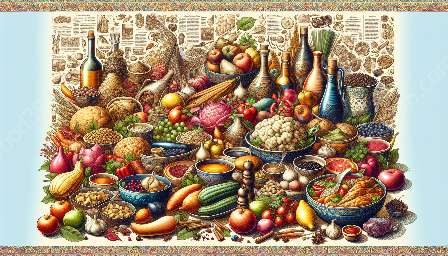Food has always held a central place in human culture, and throughout history, it has been surrounded by a rich tapestry of myths and legends. These ancient stories provide a window into the beliefs, traditions, and rituals of our ancestors, shedding light on the origins and evolution of food culture.
Ancient Food Traditions and Rituals
Ancient food traditions and rituals were deeply intertwined with myths and legends, shaping the way people interacted with the natural world and their understanding of the divine. From fertility rituals that celebrated the abundance of the earth to ceremonies honoring deities of the harvest, food played a crucial role in ancient religious and social practices.
Myths and Legends as a Reflection of Ancient Food Traditions
Many ancient cultures believed that their food-related myths and legends had a direct impact on the success of their agricultural endeavors and the well-being of their communities. The stories of gods and goddesses associated with food and fertility were seen as both symbolic and practical, guiding agricultural practices and inspiring reverence for the earth's bounty.
In ancient Egypt, the myth of Osiris, the god of the afterlife and the underworld, was intricately linked to the annual flooding of the Nile. The death and resurrection of Osiris symbolized the cyclical nature of the river's inundation, which brought fertile soil for agriculture. This myth not only provided a spiritual framework for understanding the natural world but also influenced the agricultural calendar and the timing of planting and harvesting.
Origin and Evolution of Food Culture
As societies evolved, so did their food cultures. The myths and legends surrounding food not only offered spiritual and emotional sustenance but also served as a foundation for culinary traditions and culinary practices. Ancient food-related myths influenced the types of food that were cultivated, harvested, and consumed, as well as the rituals and ceremonies associated with food preparation and consumption.
In ancient Greece, the story of Demeter, the goddess of grain and agriculture, and her daughter Persephone, who was abducted by Hades, the god of the underworld, explained the changing seasons and the cycle of plant growth. This myth was central to the Eleusinian Mysteries, a religious festival celebrating the agricultural cycle, and it underscored the connection between the earth's fertility and the well-being of the community.
Tales of Transformation and Abundance
Ancient food-related myths and legends often featured themes of transformation and abundance. Stories of gods or legendary figures transforming into plants or animals were common, reflecting the interconnectedness of the human and natural worlds. These tales also emphasized the potential for abundance and prosperity that came from honoring the earth and its gifts, fostering a deeper appreciation for the role of food in sustaining life.
Legacy of Ancient Food-Related Myths and Legends
While many ancient food-related myths and legends may seem distant from modern life, their legacy continues to shape our cultural attitudes toward food. The enduring influence of these stories can be seen in contemporary food traditions, rituals, and culinary practices that are rooted in ancient beliefs and customs.
From harvest festivals and seasonal celebrations to traditional recipes passed down through generations, the echoes of ancient food-related myths and legends reverberate through the culinary landscape. The symbolic significance of certain foods, the rituals of food preparation and consumption, and the communal aspects of sharing meals all carry forward the spirit of ancient food traditions and rituals.
Ancient food-related myths and legends offer a captivating glimpse into the complex tapestry of human history, illuminating the profound connections between people, food, and the natural world. By exploring these ancient tales, we gain a deeper understanding of the origins and evolution of food culture and the enduring significance of food in shaping human experience.


